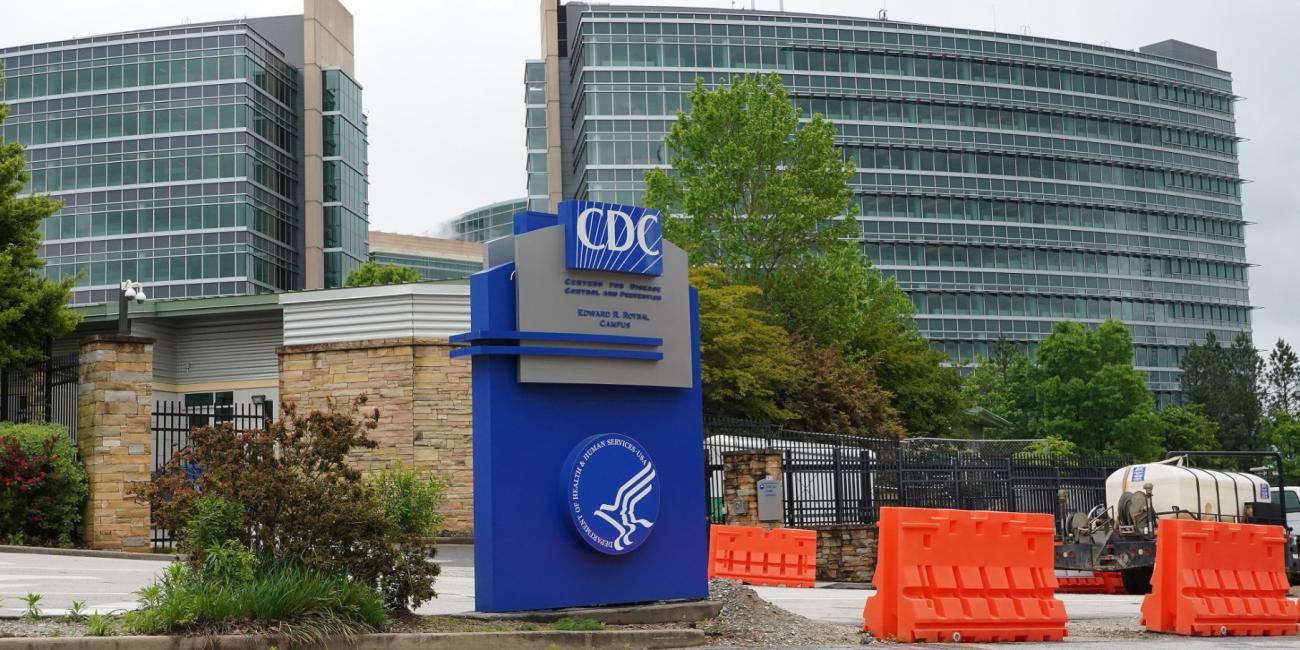
Musk shares post that misleads on Covid-19 vaccine efficacy
- This article is more than two years old.
- Published on October 18, 2023 at 22:32
- 7 min read
- By Julie PACOREL, Juliette MANSOUR, AFP France, AFP Canada
- Translation and adaptation Gwen Roley
"Have you heard dis information?" X owner Musk wrote on the platform previously known as Twitter, in a play on words captioning a video he shared on September 26, 2023.
The clip was a montage of 111 screenshots of headlines, scientific article titles and websites that purport to show diminishing levels of protection over time from vaccines against Covid-19. The edit highlights percentages in the text on the screen in red, giving the impression as the video progresses that confidence in the effectiveness of the vaccine has degraded over the course of the rollout of the shots.
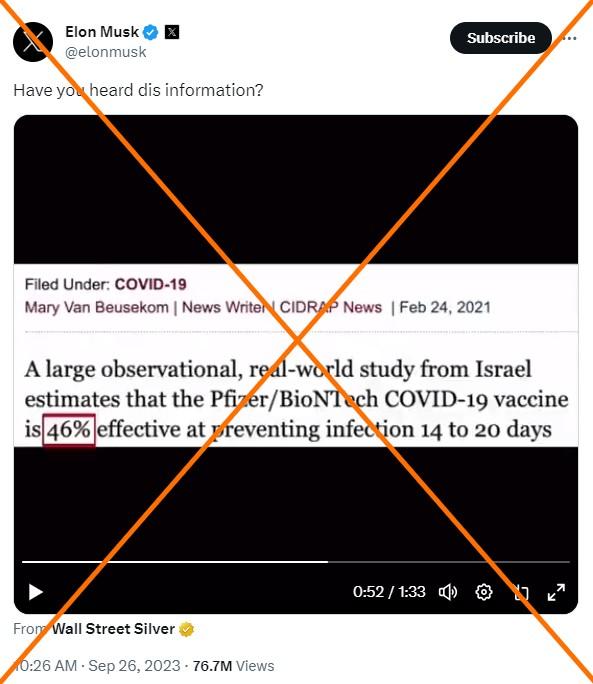
This video was not created by Musk, having already circulated on social media in November 2022, but interest in the clip following the post of the tech billionaire who bought Twitter in 2022 generated more than 635,800 likes and 197,300 reposts as of October 18.
The video spread in posts in languages including French and German and to other social media platforms such as Instagram, TikTok and Facebook.
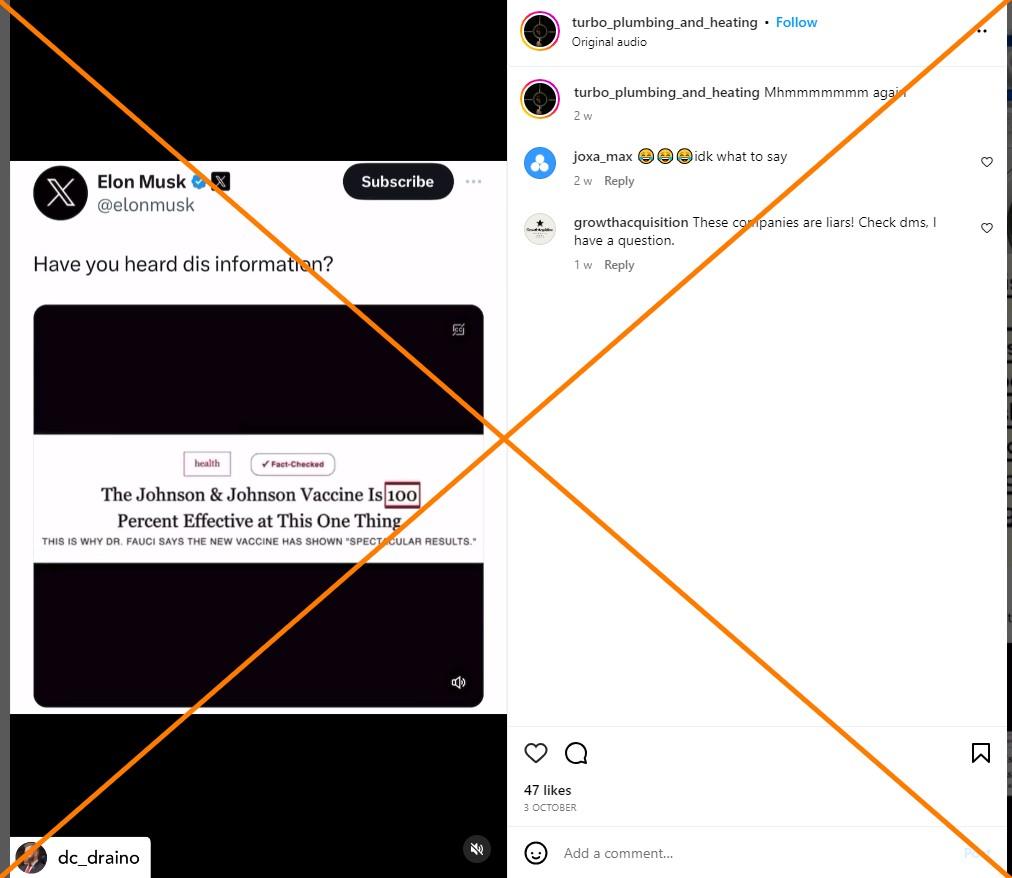
The video was also recently posted to YouTube and the Canadian video-sharing site Rumble, where it was viewed more than 11,700 times.
The claim spread by Musk is a recent example of a long trend of misinformation about Covid-19 vaccines.
However, AFP found the succession of images in the video does not follow the chronology of when each article was published and uses incomparable data by looking at results for different vaccines and reactions to different variants of the disease.
"The argument that the effectiveness or efficiency of vaccines has declined on the basis of the available data is totally false," said Jeffrey Cirillo, a professor of immunology at the University of Texas, on October 3.
Misrepresenting chronology of articles
The 111 screenshots in the montage reference articles published mostly between September 2020 and October 2021 -- with the exception of one article from 2011 (archived here), which had nothing to do the Covid-19 pandemic.
The article headlines begin with one touting 100 percent efficacy of the vaccine and then progressively passes to 85 percent, then 50 percent, before shifting to headlines with no statistics, but discussing "vaccine disasters."
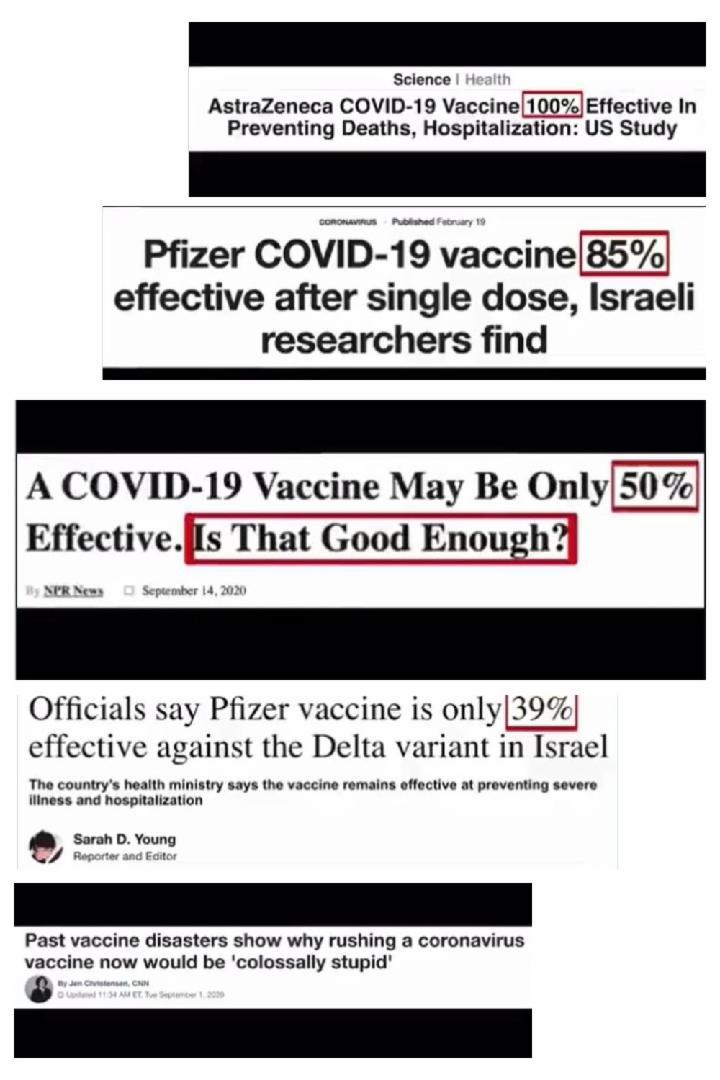
A closer look at the articles in the photo above reveals that their presentation is not chronological by publication date.
- The first article in the video, titled "AstraZeneca COVID-19 Vaccine 100% Effective In Preventing Deaths, Hospitalization: US Study," references a study from March 2021 (archived here).
- It is followed by the headline: "Pfizer COVID-19 vaccine 85% effective after single dose, Israeli researchers find" -- which is pulled from a Fox News article published in February 2021 (archived here).
- A few seconds after the Fox News headline, the video presents another title: "A COVID-19 Vaccine May Be Only 50% Effective. Is That Good Enough?" from an NPR article from September 2020 (archived here), before the public release of the first Covid-19 shots.
- Toward the end of the clip, the viewer sees a title that says: "Officials say Pfizer vaccine is only 39% effective against the Delta variant in Israel" which came out in July 2021 (archived here).
- The headline that concludes the video --"Past vaccine disasters show why rushing a coronavirus vaccine now would be 'colossally stupid'" -- is the title of an article from September 2020 (archived here).
Not comparable data
The headlines in the video also juxtapose articles which are discussing Covid-19 inoculations' effectiveness at different points during the pandemic, which saw the development of variants of the virus that were more resistant to previous formulas of the vaccine.
"A vaccine against one virus (variant) provides different levels of protection against a different virus (variant)," said Cirillo of the University of Texas.
He went on to explain that as the virus changes over time, the formula being used in a vaccine will become less efficient. This is why new vaccines have had to be developed.
"New variant vaccines have now been made available and those vaccines show high levels of protection >95% from the variants that they were made against."
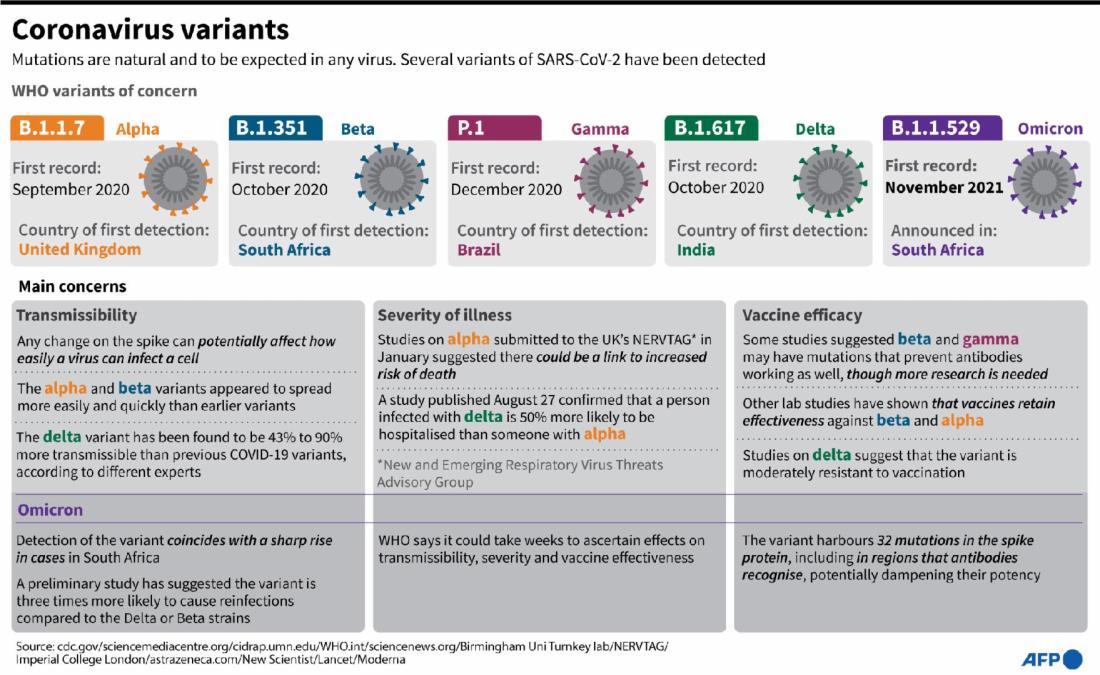
The misleading video also mixes together findings from clinical studies with the results of so-called "real-life" studies, which examine results outside of a controlled lab environment.
For example, the first study displayed in the montage shared by Musk found that AstraZeneca's vaccine was 100 percent effective against death and risk of hospitalization in a phase III clinical trial, the final stage before commercial production.
Another article from Axios published in May 2021 (archived here) which was included in the video references results from a "real-life" study conducted by the US Centers for Disease Control and Prevention (CDC), which tested American healthcare workers for the virus after being vaccinated with at least two doses of the shot.
"Real-life" studies are conducted using data collected during vaccination campaigns on a random sample of people which can therefore influence results.
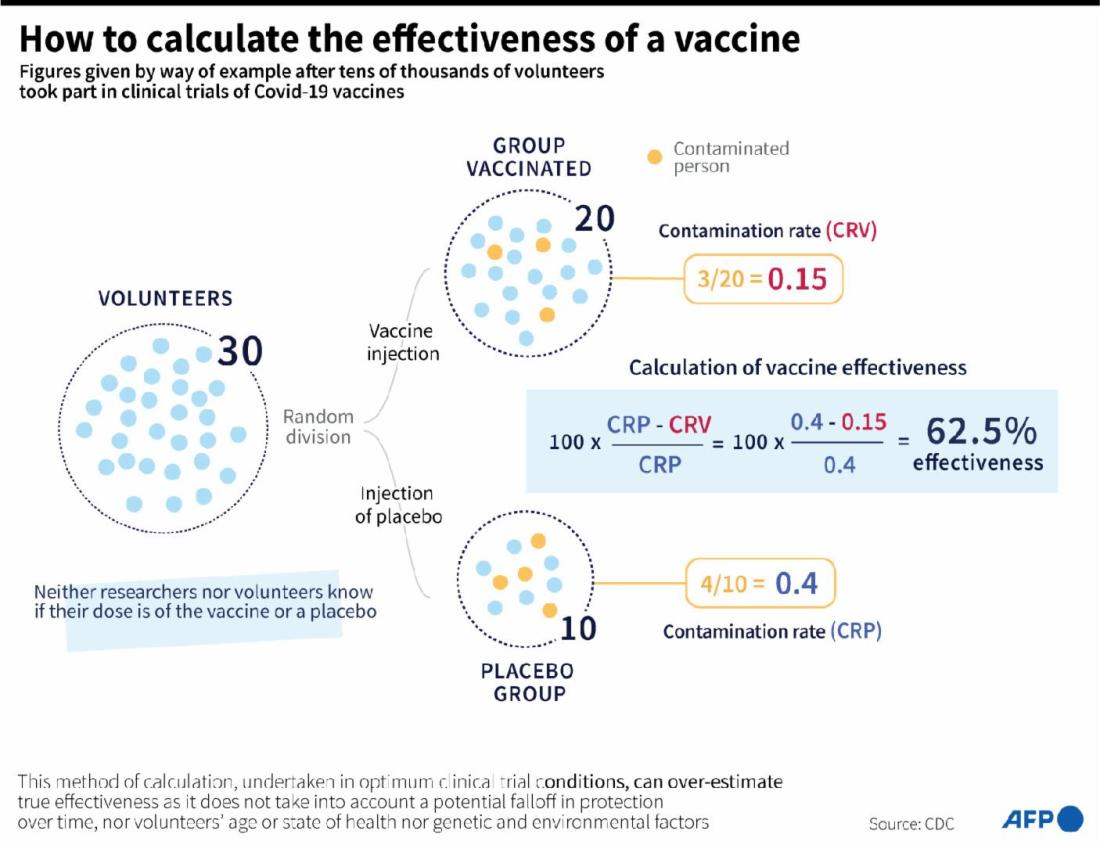
Cirillo also pointed out that all the vaccines in the video were different. The clip mixed together results from different companies using different technologies, such as the Pfizer messenger RNA vaccines and the Johnson & Johnson adenovirus vaccine, which grant immunity differently.
Different levels of effectiveness
Yves Buisson, an epidemiologist and member of the French National Academy of Medicine, told AFP on 3 October 2023, that "epidemiologists distinguish between several levels of effectiveness."
The first, determined in clinical trials, "is a vaccine's ability to elicit an immune response, known as immunogenicity," often measured by the level of antibodies in the blood, he explained.
The second level is clinical efficacy. When a vaccinated person is confronted with the virus "they can be contaminated without getting an infection, or they can get an infection without getting sick, or they can get sick and even die."
Christian Bogdan, a professor of infection immunology at the Friedrich-Alexander-Universität Erlangen-Nürnberg and member of the Standing Committee on Vaccination (STIKO) at Germany's Robert Koch Institute, told AFP that the protection provided by Covid-19 vaccines against serious illness had been proven in studies conducted before and after the public release of the shots.
"The vaccines primarily protect against severe Covid-19 infections (e.g. pneumonia) and not against milder upper respiratory tract infections," Bogdan wrote in an email on October 7.
Boosters and decreased efficacy
A handful of the headlines at the end of the video invoke the concept of booster shots, such as an article from the Daily Mail published in October 2021 (archived here) which expressed concern about fading immunity several months after the injection.
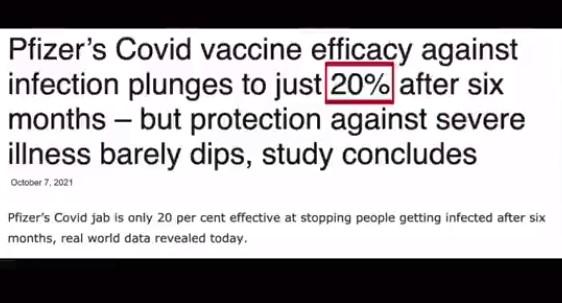
Buisson pointed out that while some vaccines provide lifelong protection against infection -- such as hepatitis B and measles inoculations -- others only provide short-term immunity -- such as diphtheria and tetanus, which must be repeated every 10 years.
"Not all vaccines are equivalent because they do not activate the same parts of our immune system," he said.
Some vaccines trigger a "sterilizing" immunity, where the response generated by the shot completely blocks the virus, as was the case with the smallpox vaccine, which eradicated the disease in 1980.
According to Hartmut Hengel, head of the Institute for Virology at the University Hospital Freiburg in Germany, the Covid-19 vaccine provides "effective immunity," which does not prevent the body from being infected but will prevent the development of the main symptoms of the disease. He pointed out that immunological memory will still decrease over time.
"The mRNA vaccines are effective, although the SARS-CoV-2 variants reduce efficacy due to escape mutations" and decreases in immunological memory, he said.
The video also discusses the potential side effects of the vaccine. Doctors have previously told AFP that some adverse reactions, such as swelling and fever, are expected to resolve within a few days of receiving the shot. Health agencies are also tracking rare, but serious adverse reactions including pericarditis and myocarditis, which impact the heart, but doctors told AFP patients are returning to normal activity in less than a year.
Medical professionals have consistently said that the benefits of receiving Covid-19 jabs outweigh the risks of adverse reactions.
More of AFP's reporting on misinformation about the pandemic can be found here.
Copyright © AFP 2017-2026. Any commercial use of this content requires a subscription. Click here to find out more.
Is there content that you would like AFP to fact-check? Get in touch.
Contact us



